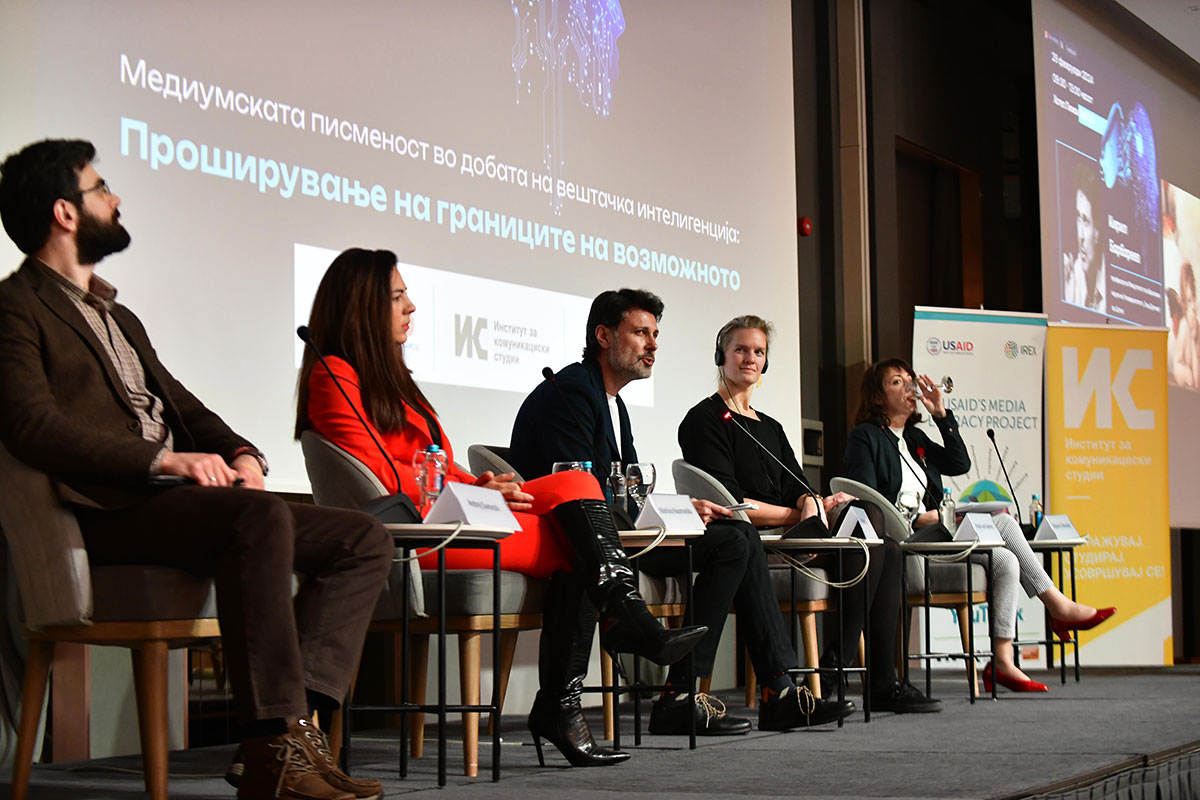Although artificial intelligence offers many benefits, it is essential not to overlook the importance of human interaction, empathy and mentoring in learning, says Kristin Van Damme, a lecturer and researcher at the University of Ghent, Belgium who was one of the speakers on this topic at the symposium organized by ICS and the partners. She further adds that AI literacy and ethics must become an integral part of the curriculum, but at the same time warns not to overlook the importance of the role of teachers.
How do you envision artificial intelligence revolutionizing traditional education methods and enhancing the learning experience for students?
To be honest, I’m not the one who will claim AI will take over education soon. I have a background in journalism studies, and an important aspect of AI in journalism is ‘keeping the humans in the loop’, where people – journalists – are still responsible for content. The same should be in education, if you ask me. I am a teachers advocate, and hope they will become ven more important in the future.
That said, off course, artificial intelligence does off course possess the potential to transform traditional education methods by personalizing learning experiences and (hopefully) streamlining administrative tasks. Related to the first, here I see a true potential. Imagine pupils get adapted content, tailored to their interest. Through AI-driven adaptive learning systems, students can receive customized instruction tailored to their individual learning styles and pace, leading to improved comprehension and retention. Related to the second, maybe I’m just hopeful [laughs]. AI could automate administrative tasks such as grading, allowing educators to allocate more time to providing meaningful feedback and engaging with students. Additionally, AI analytics can provide insights into student performance and engagement, enabling educators to identify at-risk students early and intervene proactively.
In each case, I am truly convinced we need people in education, so I hope we will not shift to education provided by AI-powered virtual tutors or chatbots. AI should be used to support teachers, obviously not replace them.
Can you provide examples of successful AI implementations in education that have positively impacted student outcomes or teaching effectiveness?

I will first talk from my own experience. In my courses, I stimulate students to use genAI tools for brainstorming. For example, to help them with the outlines of papers they need to write. Also, I tell them to use ChatGPT to practice for their exams by letting it produce questions.
I am convinced that students can only learn what these tools can – and can not do – by using them. The first times you use these tools, it is spectacular. But after using it often, you get to notice it often produces empty word. A lot of words, saying little. Last year, I had students writing an essay. After, I told them to let Rytr write an essay. Some students stated the essays were in fact the same. So then the next step is: let students write that AI powered essay, and then rewriting it to may it human.
Looking beyond my courses, a notable example of AI implementation in education is adaptive learning platforms like Khan Academy and Duolingo. These platforms use AI algorithms to analyse how you perform and deliver personalized learning experiences tailored to individual strengths and weaknesses. Studies have shown that students using these platforms demonstrate improved learning outcomes compared to traditional classroom settings, as the content adapts to each student's pace and mastery level.
In what ways can AI be utilized to personalize learning experiences for students with different learning styles and abilities?
AI can customize educational experiences for students with diverse learning styles and capabilities in various ways. As mentioned, AI-powered adaptive learning platforms can analyse student performance data and adjust the difficulty level, pace, and content of learning materials to match individual preferences and needs. For example, visual learners may receive more diagrams and videos, while auditory learners may be presented with audio-based explanations.
Talking about modality, what I like is the adaptation of content, I see a potential for inclusive education as well. AI can support inclusive education by providing accessibility features such as speech-to-text or text-to-speech functionalities, alternative formats for learning materials, and adaptive interfaces that accommodate students with disabilities or special needs. In journalism, there are experiments being done to bring the news via AI generated graphic novels. While I doubt this format will be sustainable for news, imagine what it could do for teaching history.
Others will also claim that natural language processing (NLP) algorithms can enable AI chatbots and virtual tutors to interact with students in real-time, providing personalized feedback and assistance tailored to each student's learning style. For instance, a student who learns best through hands-on activities may receive suggestions for interactive simulations or experiments. To be honest, I’m a bit reluctant for those. I’m seen this enthusiasm before, and contributed to multiple self-pased courses. Here, we noticed the importance of going to class, having shared experiences with fellow studies,… In turn, other students flourish by studying on their own pace, without such a class context. And AI helps providing that content.
What ethical considerations should be taken into account when implementing AI in educational settings, especially in terms of student privacy and data security?

When implementing AI in educational settings, ethical considerations regarding student privacy and data security are off course paramount. As AI tools in education collect sensitive student data, educational institutions must adopt robust data protection measures to ensure that personal information remains confidential and secure. To do so, clear policies must be established to govern the collection, storage, and usage of student data.
As always, transparency is key; students, parents, and educators should be informed about the types of data collected, how it will be used, and their rights regarding its protection. Even more so, they should be made aware how AI in incorporated in the technology. Educators and institutions should aim for transparency from AI providers, seeking to understand how AI makes recommendations and decisions to maintain control over the educational process. Solutions could also include encryption, access controls, but especially fostering a culture of privacy awareness among educators and students.
When it comes to data security, measures should be implemented to safeguard student data against unauthorized access, breaches, or misuse. This includes robust encryption protocols, secure authentication mechanisms, and regular security audits to identify and address vulnerabilities. While educators and teachers often have good intentions, daily routines might result in data ignorance or forgetfulness, which could involuntarily lead to data breaches. By now, most teacher have shifted to web-based services, yet there is hardly any training on data hygienics.
Furthermore, educators and developers must be aware about algorithmic bias and discrimination in AI systems. Bias can inadvertently perpetuate inequalities by favoring certain demographic groups or reinforcing stereotypes. To address this, diverse and representative datasets should be used to train AI models, and algorithms should be regularly audited and tested for fairness and accuracy.
While I now highlighted some aspects teachers should take into account, he same goes for students. AI literacy and ethics must become part of the teaching curricula, as the use of genAI is raising for educational purposes.
Can you discuss the potential of AI in automating administrative tasks for educators, allowing them to focus more on teaching and mentoring?

AI-powered systems can automate routine tasks such as evaluating assignments and tests and scheduling classes, allowing educators to spend more time teaching and less time on administrative tasks. Aspirations arise that AI can make a substantial impact is in grading and assessment, yet this depends on the course. I tried, for example, creating a scoring system with ChatGPT, but none of the question I had asked by students (in an open book exam on innovation research) could be answered by ChatGPT in a sufficient way. Sure, these systems will improve, yet do date we, as lecturers, still need to do the grading ourselves.
That said, AI can assist teachers by providing them with educational material/resources without wasting much time by looking, and providing content based on the student’s needs, learning style, and pace.
When it comes to mentoring, I believe some students would be helped with an AI doubled, that guides hem through studying. As mentioned, AI can also help analyse the student’s performances and identify their strengths and weaknesses, for example by assessing their writing or presentations. This type of real-time feedback to students can help them understand their progress and areas that need improvement. This motivates students to take ownership of their learning and encourages self-directed learning habits.
Personally, I am currently experimenting with an AI supported to-do list. So rather than using it for my courses, I am trying to find ways to keep on top of thing for all the small tasks aside my course. The app convinced me, AI can streamline administrative workflows by automating routine tasks such as scheduling, resource allocation, and communication. It’s too soon to say whether it works though. I did not make the deadline for this interview, for example, even though I had entered it in my AI assistant [laughs].
As AI becomes more prevalent in education, how can educators and institutions strike a balance between technology-driven learning and maintaining a human touch in the educational process?

While AI offers numerous benefits in terms of personalization, efficiency, and accessibility, it's essential not to overlook the importance of human interaction, empathy, and mentorship in the learning experience. As argued, keeping humans in the loop is crucial.
Firstly, teachers can leverage AI as a tool to enhance, rather than replace, human-led instruction. By integrating AI-driven adaptive learning platforms and virtual tutors into their teaching practices, educators can personalize learning experiences, provide immediate feedback, and facilitate differentiated instruction. However, it's crucial for educators to maintain a presence in the learning process, offering guidance, encouragement, and support to students as they navigate complex concepts and challenges.
Secondly, we must not forget that going to university is a social experience for many students. Remember how depressions among youngsters peaked during the pandemic? While AI can facilitate individualized learning experiences, human interaction remains essential for developing interpersonal skills and cultivating a sense of community and belonging within the classroom. To the vast majority, being surrounded by people outperforms being alone with screens.

